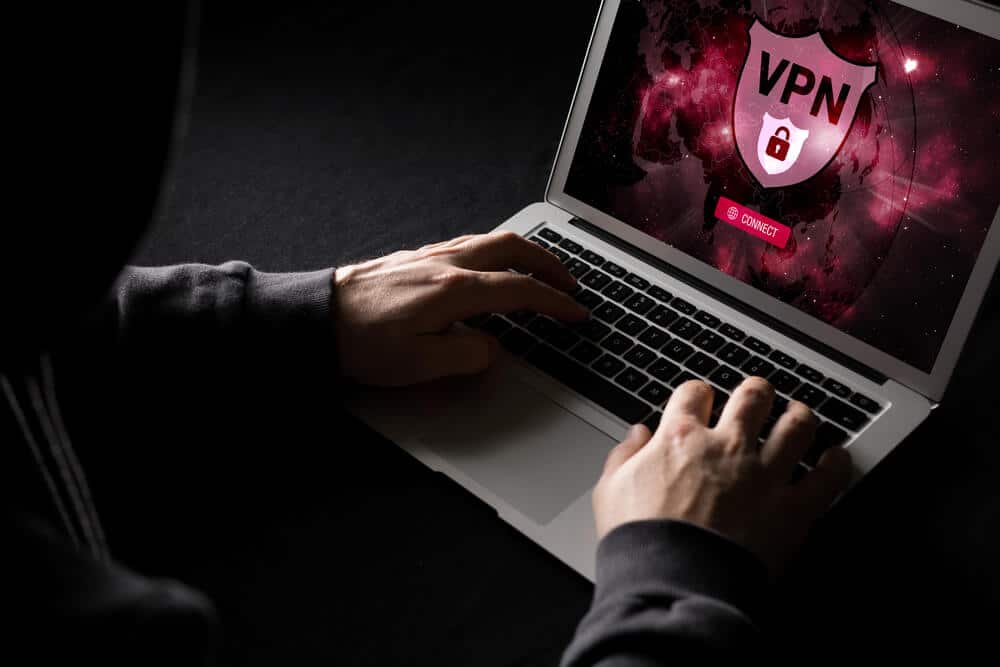A VPN can make you go camouflage on the web and give you secure access to everything. It can even bypass geo-restrictions imposed by providers or the government. So it becomes a matter of debate whether a VPN is legal or not when you’re carrying out your everyday internet activities with it.
What Is A VPN & How It Works?
When connected to a VPN server, it masks your original IP address to provide you security and anonymous browsing on the internet. This makes sure that you don’t get targeted by hackers or third parties on the web looking to exploit your personal information.
To give you an insight into how a VPN changes your IP address, it simply creates a secure bridge between the user and the VPN server.
The VPN server then assigns you an IP address that shields your original IP. You can perform all your internet activities with a bogus identity and all your traffic is encrypted moving from your end to the VPN server, and then to the destination.
Is Using a VPN Legal?
Yes, performing your online activities with a VPN is legal, at least in the US. In fact, companies use VPNs to secure their internal networks and to restrict unauthorized access to the company network.
Other than that, there are some countries that ban the usage of VPN, like China, Belarus, or Russia. As a matter of fact, China Firewalls are so adaptive and advanced, that it is impossible for any VPN service to survive there.
Whether you can use a VPN or not, entirely depends on the country you’re residing in. So make sure you traverse your attention to the VPN laws of the region you’re in.
Although, it is to be kept in mind that carrying out illegal activities with a VPN is still illegal. The primary reason for using a VPN is to have secure access to the internet and to avoid hackers and exploiters having the intention to monitor or manipulate your internet traffic.
Do You Have the Right to Browse Privately?
Unfortunately, no. The laws passed in 2018 abolished the right to protect internet privacy. Companies can now sell your browsing history to concerned parties to analyze online behavior and browsing habits.
Government authorities and ISPs can track your online traffic which can only be avoided by using a VPN whenever you perform your online activities on the internet.
But it is important to get a VPN subscription from a reliable VPN provider that has strict logging policies because you don’t want to eliminate one party and then gift your traffic access to another one.
A VPN will encrypt all your traffic and at the same time, mask your IP address. Even if your ISP or any other party gets access to your online activities, it’ll be in gibberish, which will make no sense at all.
Why VPNs Are Used?
VPNs can add a good contribution to keeping your online identity secure and anonymous while you’re surfing on the web. Here are some other benefits of a VPN.
It Masks Your Original IP Address
If you’re worried about your original IP being exposed on the web then VPN is your answer. You can connect to any VPN server and change your IP address with a single click of a button.
You can perform all your internet activities with that VPN-assigned IP address and no one can have a trace of your online traffic.
Get a subscription plan for a VPN service that has a maximum number of VPN servers available in different countries.
It Gives You Access to Geo-Restricted Websites
Countries can have restrictions on some websites or applications. You can easily access your favorite content on the internet, even if it’s blocked in your country.
You just have to launch your VPN and change your location to a region where the website is available. That’s it, you can now have access to any website you want.
It Unlocks International Netflix Libraries
Netflix has licensing agreements with studios for which they restrict certain movies and TV shows in some regions. You cannot watch the same movie your friend from the states is watching, even if both of you have the same subscription plan.
For that, you need to be subscribed to a reliable VPN service and change your region to have access to unlimited movies and TV shows of other regions.
It Guards Your Traffic On Public WiFi
Who doesn’t like free WiFi? It is likely that you’ll find free WiFi networks in coffee shops or restaurants to which anyone can connect, if in the range. These public networks are not secure as some exploiter connected to the same network can snoop on your internet traffic.
Or worse, what if that wifi is not the restaurant’s or the coffee shop’s in which you’re sitting in, but an evil twin network which a third party has created to hack your personal data?
So beware of the free wifi networks and always make sure your VPN is turned on whenever you’re on a public network. It will encrypt all your traffic, terminating the dangers of your personal information getting hacked by third parties.
Wrapping it up!
A VPN is for secure access to your everyday internet activities and it’s perfectly legal. Although it depends on which country you’re living in as some countries restrict the use of a VPN service. Moreover, illegal activities carried out with a VPN or not, still remain illegal.


